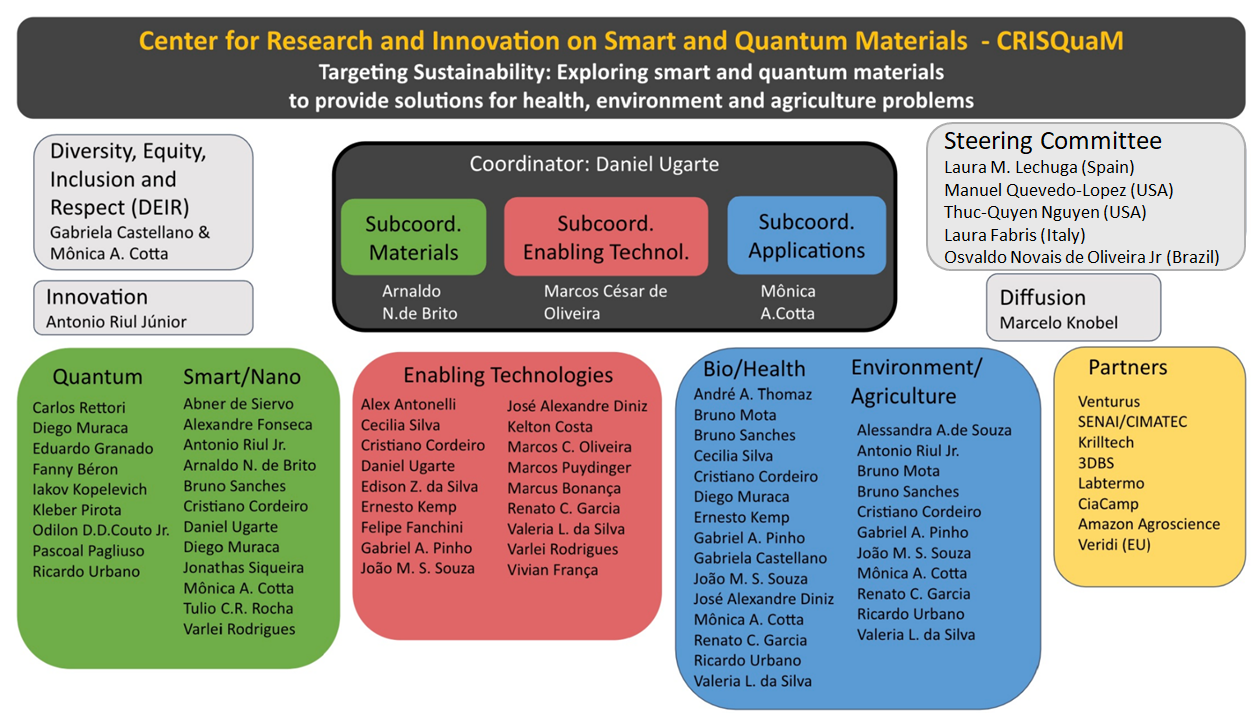BV-FAPESP: research projects supported in this Center
CRISQuaM in the Media: news about the center
CRISQuaM aims to explore the synergistic development of fundamental and applied science to create new materials with high potential for the construction of devices and sensors to address technological challenges related to sustainability, climate change, precision agriculture, ecology, and health. To achieve these goals, we have assembled an interdisciplinary and collaborative research team, integrating expertise across various scientific domains, researching novel materials with high innovation potential. By combining original synthesis methods, advanced characterization techniques, theoretical approaches, computational simulations, quantum technologies, and device construction designs, we aim to drive advances in smart and quantum materials, promoting scientific excellence and technological development. With this, we plan disruptive innovations in instrumentation—including hardware and AI-based tools—as well as in quantum technologies, biomedical devices, and signal processing, in addition to plant bionics, exploring plant-pathogen interactions. Besides research activities, we plan intensive actions in education, dissemination, and communication for the general public, as a modern society should be aware of the challenges humanity faces and how research and technology are essential for responsibly utilizing the planet's limited resources. CRISQuaM's Innovation activities are accelerated through partnerships with several companies in related technologies, many of them Brazilian. Finally, all activities of the Center are managed in accordance with diversity, equity, and inclusion goals and best practices.
The Center brings together scientists, engineers, and innovators in a collaborative effort to apply materials science and quantum technologies at the cutting edge, designing new materials and nano(bio)sensors for advanced diagnostics. The Center has a team capable of producing a wide range of (nano/micro) materials, along with precise chemical and physical characterizations using modern techniques (synchrotron, advanced microscopy, magnetotransport, magnetic resonance, optics, etc.). In addition, the team offers various options in enabling technologies, including miniaturization, processing, and additive manufacturing, as well as instrumentation, quantum sensing, and electronics development. Data analysis will employ updated approaches (numerical simulation, classical and quantum machine learning, and quantum optimization). Applications at the knowledge frontier will address urgent sustainability needs in environmental areas, precision agriculture, plant bionics, and biomedical interfaces, contributing to the development of local technologies in close partnership with the Brazilian industry.
The organization of the Center is based on three pillars — Materials, Enabling Technologies, and Applications — together with partner companies, as described in the figure below.

2024-10-09
Researchers at the University of São Paulo conducted an experiment to observe the effects on soil samples of extreme conditions in terms of temperature and rainfall in the laboratory. Their findings show that the balance of greenhouse gas emissions from microbial decomposition of organic matter may change.
2024-10-09
Marine organisms in areas influenced by lower sea surface temperatures, such as the Lakes Region in Rio de Janeiro state, are between 25% and 100% larger than those inhabiting warmer water along the coast of São Paulo state, the study shows.
2024-10-09
FAPESP has signed a scientific and technological cooperation agreement with Quebec’s research funding agency and is planning a new edition of FAPESP Week in Canada’s second most populous province.
2024-10-09
Leaders of FAPESP met with representatives of France’s National Research Agency (ANR), Ministry of Higher Education and Research, and Ministry of Foreign Affairs to intensify joint research and unveil CNRS’s new International Research Laboratory at the University of São Paulo.
2024-10-09
An invention developed at the State University of Campinas (UNICAMP) obtains theobromine and caffeine from coca bean husks using stingless bee honey as a solvent. The method is a safe alternative to conventional processes, which can be harmful to human health and the environment.
2024-10-03
When the dust that covered the skies 66 million years ago prevented plants from photosynthesizing and benefited creatures that fed on decomposing organic matter, these insects selected species that could fill their nutrient void, confirms a study published in Science.